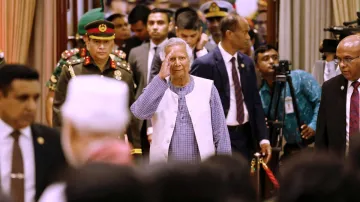Dhaka: Nearly three days after Muhammad Yunus took oath as the head of Bangladesh's interim government, a court acquitted him in a graft case filed by the Anti-Corruption Commission, according to a media report. Judge Md Rabiul Alam of the Special Judge's Court-4 of Dhaka accepted the Anti-Corruption Commission's application which was filed with the court, seeking withdrawal of prosecution of the case, following section 494 of the Code of Criminal Procedure, an official of the anti-graft agency was quoted as saying by The Daily Star newspaper.
Top officials also get relief
On August 7, a Dhaka court acquitted Yunus and three top officials of Grameen Telecom - Ashraful Hassan, M Shahjahan and Nurjahan Begum - in a labour law violation case. Yunus, the 84-year-old economist, on Thursday took oath as the chief adviser of the interim government. Nurjahan Begum, who was also an accused in the graft case, is a member of the 16-member Council of Advisers which will assist Yunus in running the state's affairs.
Yunus had been in a protracted row with the Sheikh Hasina government for obscure reasons, while authorities initiated a series of investigations against him after she came to power in 2008.
Why did the Hasina government take action against Yunus?
Bangladesh authorities launched a review of the statutory Grameen Bank's activities in 2011 and fired Yunus as its founding managing director on charges of violating the government retirement regulation. Yunus was charged under dozens of cases during Hasina's regime. In January, a court sentenced Yunus to six months in jail on charges of labour law violation. Many people believe Hasina became enraged when Yunus announced that he would form a political party in 2007 when a military-backed government ran the country and Hasina was in prison.
The student-led movement that ousted Hasina grew out of protests against quotas in government jobs that spiralled in July, provoking a violent crackdown that drew global criticism, though the government denied using excessive force. The protests were fuelled also by harsh economic conditions and political repression. The COVID-19 pandemic damaged the $450 billion economy after years of strong growth, leading to high inflation, unemployment and shrinking reserves. It pushed the Hasina government to seek a $4.7 billion loan from the International Monetary Fund.
(With inputs from agencies)
ALSO READ: Sheikh Hasina accuses US of hatching conspiracy to topple her govt in Bangladesh: Reports
Latest World News
